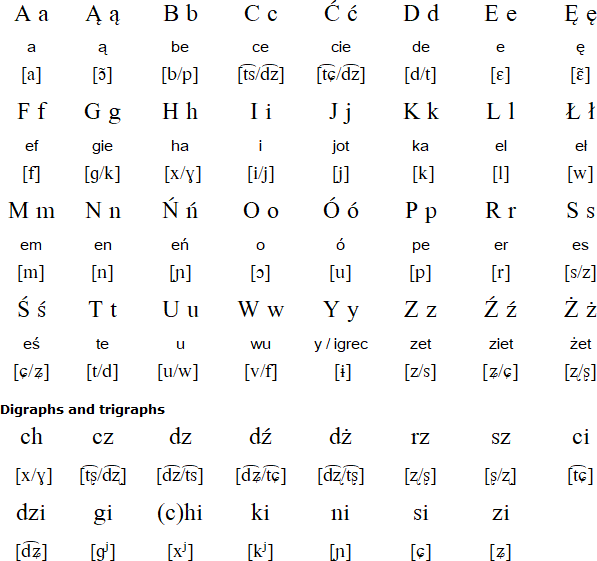Overview
Overview from Omniglot.
Origin
Polish is a Western Slavonic language with about 40 million speakers mainly in Poland. There are also significant Polish communities in Lithuania, Belarus and Ukraine, and significant numbers of Polish speakers in many other countries, including the Czech Republic, Germany, Slovakia, Latvia, Romania, the UK and USA. Polish is closely related to Kashubian, Lower Sorbian, Upper Sorbian, Czech and Slovak.
Polish first appeared in writing in 1136 in the "Gniezno papal bull" (Bulla gnieźnieńska), which included 410 Polish names. The first written Polish sentence was day ut ia pobrusa a ti poziwai (I'll grind [the corn] in the quern and you'll rest), which appeared in Ksiega henrykowska in 1270. In Modern Polish spelling that sentence is daj ać ja pobruszę, a ty poczywaj.
Great Polish poets include Jan Kochanowski (1530-84) and Adam Mickiewicz (1798-1855), the 'national bard' and author of an epic entitled "Pan Tadeusz". The most famous writer of Polish orgin is Joseph Conrad or Konrad Korzeniowski (1857-1924), who wrote in English and started out as a sailor.
Literary Polish is based on the dialects of Gniezno, Cracow and Warsaw, though there is some dispute about this.
The native name for Polish is polski (Polish), język polski (the Polish language), or more formally, polszczyzna (Polish).
Polish Alphabet and Pronunciation

Notes
Notes
The letter ó is also known as o z kreską, and y is also known as igrek
a is a low central vowel for which there is no symbol in the IPA
ą = [o] before l or ł. When followed by plosive or affricate consonants, ą is pronounced [ɔn], [ɔŋ] or [ɔm]. E.g. dąb = [dɔm].
ę = [e] before l or ł or at the end of a word. When followed by plosive or affricate consonants, ę is pronounced [ɛn], [ɛŋ] or [ɛm]. E.g. tęcza = [ɛn].
The i in ci, dzi, ni, si and zi is not pronunced when they are followed by another vowel, e.g. dzień
u sometimes = [w] in loanwords like auto [awtɔ] 'car'
Voiced consonants can become unvoiced at the end of words, end in clusters with unvoiced consonants. E.g. klub = [klup].
Unvoiced consonants can become voiced in clusters with voiced consonants. E.g. prze = [prʂɛ].
The letters q (ku), v (fau) and x (iks) are also used, but only for foreign names or words.
Vocabulary Building

Here are some simple vocabulary quizzes. For a glossary of often used words try this page.Want to learn Polish months and how to pronounce them? Warsaw Social has a video for that, and more Polish language learning videos.